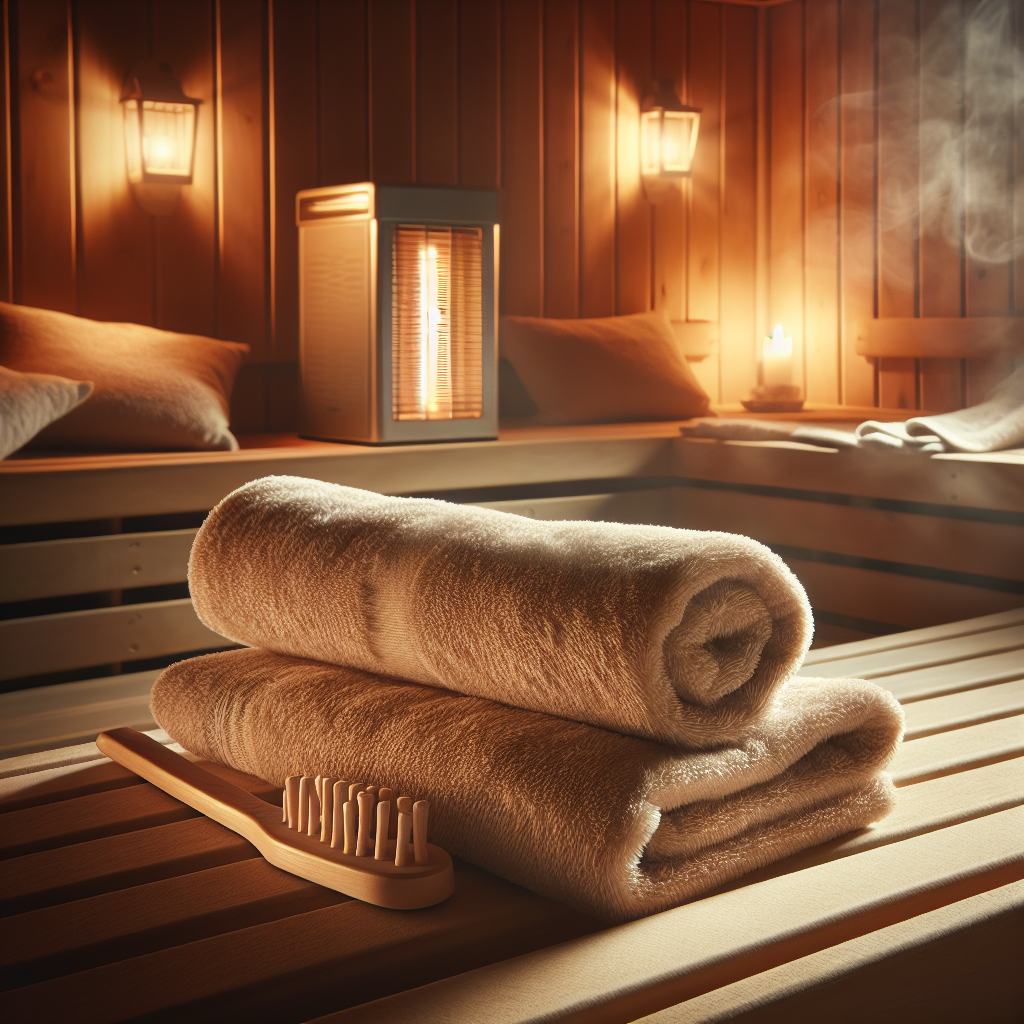Do you ever find it difficult to fall asleep at night? Well, you might be surprised to learn that saunas could be the key to a better night’s rest. Saunas have been used for centuries as a way to relax and unwind, but their effects on sleep have only recently been studied. In this article, we will explore the various ways that saunas can impact your sleep patterns and help you achieve a more restful slumber. So, sit back, relax, and learn how saunas could be the secret to a good night’s sleep!
Benefits of Saunas for Sleep
Saunas offer numerous benefits for improving sleep quality and addressing sleep-related issues such as insomnia. By incorporating regular sauna sessions into your routine, you can experience the following benefits:
Decreased Insomnia
Insomnia is a common sleep disorder characterized by difficulty falling asleep or staying asleep. Sauna use can help alleviate insomnia by promoting relaxation and reducing stress levels. The heat from the sauna stimulates the production of endorphins, which are natural chemicals that help you relax and feel good. As a result, you can enjoy a deeper and more restful sleep.
Relaxation
Saunas provide a tranquil environment that promotes relaxation and reduces tension. The heat helps to soothe your muscles, release tension, and relieve stress. When your body is relaxed, it becomes easier to fall asleep and stay asleep throughout the night. Spending time in a sauna before bedtime can act as a calming pre-sleep ritual, preparing your body and mind for a peaceful night’s rest.
Improved Sleep Quality
Saunas have been found to enhance the overall quality of sleep. The heat generated in the sauna increases blood flow, which improves oxygen and nutrient delivery to your muscles and tissues. This increased circulation helps your body relax, promotes muscle recovery, and aids in the repair and growth of cells. With improved blood circulation and cellular rejuvenation, you can experience a greater sense of renewal and wake up feeling refreshed and energized.
Effects on Body Temperature
Understanding how saunas affect body temperature is crucial for comprehending their impact on sleep. Sauna use influences your body’s temperature in the following ways:
Increased Core Body Temperature
When you sit in a sauna, your body’s core temperature rises due to the heat exposure. This increase in core body temperature can lead to physiological changes that support improved sleep. As your body temperature rises, it stimulates the release of endorphins, which induce relaxation and a sense of well-being. This temperature elevation also triggers a subsequent drop in body temperature, which can help initiate the onset of sleep.
Development of Thermoregulation
Regular sauna sessions can help train and enhance your body’s thermoregulatory mechanisms. Thermoregulation is the process by which your body maintains a stable internal temperature. By exposing yourself to the repeated heating and cooling cycles in a sauna, you are essentially training your body to regulate its temperature more efficiently. This enhanced thermoregulation can contribute to improved sleep by keeping your body at an optimal temperature throughout the night.
Decreased Body Temperature before Sleep
One of the key factors contributing to falling asleep is a decrease in body temperature. Sauna use can aid in this reduction by raising your body’s core temperature and subsequently initiating a rapid drop in temperature upon leaving the sauna. This temperature drop mimics the natural cooling process that occurs during sleep. By creating a more conducive environment for falling asleep, the sauna can help promote a faster onset of sleep and maintain a cooler body temperature throughout the night.

Impact on Circadian Rhythm
Sauna use can have a positive impact on your circadian rhythm, the internal biological clock that regulates your sleep-wake cycle. This can be attributed to the following effects:
Regulation of Melatonin Production
Melatonin is a hormone that plays a crucial role in regulating sleep-wake cycles. Sauna sessions can help regulate the production of melatonin by increasing your body’s core temperature. This temperature elevation triggers the release of melatonin, which promotes drowsiness and prepares your body for sleep. By aligning melatonin production with your desired sleep schedule, saunas can help regulate your circadian rhythm for a more restful sleep.
Synchronization of Body Clock
The regular use of saunas can help synchronize your body clock, ensuring that it aligns with external cues such as light and darkness. By exposing yourself to the sauna’s heat and subsequent cooldown, your body becomes accustomed to these patterns. This synchronization can aid in establishing a more regular sleep-wake cycle, improving your overall sleep quality.
Improved Sleep-Wake Cycle
By positively influencing melatonin production and synchronizing your body clock, saunas can contribute to an improved sleep-wake cycle. A balanced sleep-wake cycle allows you to fall asleep more easily at night and wake up feeling refreshed in the morning. By incorporating sauna sessions into your daily routine, you can establish a healthier sleep pattern and experience a consistent, restorative sleep.
Reduction of Stress and Anxiety
Stress and anxiety can significantly impact sleep quality and duration. Sauna use offers the following benefits for reducing stress and anxiety:
Lowered Stress Hormone Levels
Saunas help reduce the levels of stress hormones in your body, such as cortisol. When exposed to the heat of the sauna, your body reacts by activating its relaxation response and releasing endorphins. Endorphins are natural mood-boosting chemicals that promote feelings of relaxation and well-being. By reducing stress hormone levels and increasing endorphin production, saunas create a conducive environment for improved sleep.
Relief from Anxiety
Anxiety can be a major cause of sleep problems, making it difficult to relax and fall asleep. Sauna sessions can provide relief from anxiety by fostering a sense of tranquility and calmness. The heat and the therapeutic environment of the sauna create a distraction-free space where you can unwind and let go of daily stressors. By allowing yourself this time to decompress, you can alleviate anxiety and prepare your mind for a peaceful, uninterrupted sleep.
Enhanced Sleep
The reduction of stress and anxiety, coupled with the promotion of relaxation, has a direct positive impact on sleep quality. As saunas help lower stress hormone levels, relieve anxiety, and induce relaxation, they contribute to an enhanced sleep experience. By incorporating saunas into your routine, you can create an atmosphere conducive to restful sleep and allow your mind and body to fully rejuvenate during the night.

Promotion of Muscle Relaxation
Muscle tension and discomfort can significantly impact sleep quality and make it challenging to achieve a restful state. Saunas promote muscle relaxation through the following mechanisms:
Relief of Muscle Tension
The heat of a sauna can help relieve muscle tension by increasing blood flow to your muscles. This improved circulation allows for the delivery of oxygen and nutrients to your muscles, facilitating their relaxation. Additionally, the warmth of the sauna helps to alleviate muscle pain and stiffness, providing relief from discomfort and promoting a more comfortable sleeping position.
Improved Blood Circulation
Sauna use leads to improved blood circulation, which has numerous benefits for promoting muscle relaxation. Enhanced blood flow ensures that your muscles receive an adequate oxygen supply, promoting tissue repair and regeneration. Moreover, improved circulation helps eliminate waste products, such as lactic acid, from your muscles, reducing soreness and stiffness. By promoting muscle relaxation through improved circulation, saunas can contribute to a more comfortable and peaceful sleep.
Reduced Restlessness
Muscle restlessness can often disrupt sleep and prevent you from attaining deep, restorative rest. Saunas can help reduce restlessness by soothing and relaxing your muscles. As the heat from the sauna penetrates your muscles, it promotes a sense of calmness and eases any muscle tension or restlessness you may be experiencing. By alleviating muscle discomfort, saunas can help minimize sleep disturbances and enable you to achieve a more peaceful and uninterrupted night’s sleep.
Detoxification and Sleep
Saunas play a crucial role in promoting detoxification, which can positively impact your body’s functioning and, consequently, your sleep:
Elimination of Toxins
When exposed to the heat of a sauna, your body’s natural cooling mechanisms are activated, resulting in sweating. Sweating is one way your body eliminates toxins and waste products, such as heavy metals and chemicals. By sweating in a sauna, you support your body’s natural detoxification processes, enabling it to flush out these harmful substances. A body that is free from toxins functions more efficiently, leading to improved sleep quality.
Improved Body Functioning
Detoxification through sauna use helps improve overall body functioning, including organ health and circulation. By flushing out toxins, saunas support optimal organ function, allowing them to perform their roles more effectively. Improved circulation, as a result of sauna-induced sweating, ensures that oxygen and nutrients are delivered throughout your body, nourishing your cells and promoting overall well-being. When your body is functioning optimally, sleep quality is enhanced, allowing for a more rejuvenating and restorative sleep.
Enhanced Sleep Quality
The combined effects of eliminating toxins and improving body functioning through sauna use contribute to enhanced sleep quality. By removing toxins that can interfere with your body’s natural processes, such as hormone regulation and cellular repair, saunas create a cleaner internal environment. This cleaner environment, coupled with improved organ function, promotes more efficient sleep cycles and a deeper, more rejuvenating sleep.
Time and Frequency of Sauna Use
To optimize the benefits of sauna use for sleep, it’s essential to consider the ideal timing and frequency of sessions:
Ideal Time for Sauna Sessions
The optimal time for sauna sessions may vary based on individual preferences and schedules. However, it is generally recommended to have your sauna session approximately 1-2 hours before your desired bedtime. This timeframe allows your body enough time to cool down following the sauna session, which helps initiate the sleep process. By incorporating sauna sessions into your pre-sleep routine during this time window, you can harness the relaxation and temperature effects to enhance your sleep quality.
Recommended Sauna Frequency
The frequency of sauna use for sleep-related benefits can also depend on individual needs and preferences. However, starting with 2-3 sauna sessions per week is a recommended baseline. As you acclimate to sauna use and assess how it affects your sleep, you can gradually increase the frequency if desired. It is important to listen to your body and adjust sauna sessions accordingly, as excessive heat exposure can have adverse effects. Regular, consistent use of saunas can yield optimal benefits for sleep and overall well-being.
Precautions and Limitations
While sauna use offers numerous benefits, it is important to exercise caution and consider any potential limitations or risks. It is advisable to consult with a healthcare professional, especially if you have any pre-existing health conditions or concerns. Certain individuals, such as pregnant women, individuals with cardiovascular issues, or those taking specific medications, may need to abstain from using saunas or modify their sauna sessions. Additionally, it is crucial to stay properly hydrated during and after a sauna session to support healthy bodily functions. Always listen to your body and practice moderation to ensure safe and effective use of saunas for sleep.
Sauna Temperature and Sleep
Understanding the effects of sauna temperature on sleep can help you optimize your sauna experience for better sleep quality:
Effects of High Temperature
High-temperature saunas, such as traditional dry saunas or infrared saunas, can have varying effects on sleep. The intense heat exposure can be invigorating for some individuals, promoting circulation and relaxation. However, for others, excessively high temperatures can be overwhelming and potentially disrupt sleep. It is essential to gauge your personal tolerance for high temperatures and adjust accordingly. If you find high-temperature saunas to be too stimulating, you may opt for moderate-temperature saunas as an alternative.
Moderate vs. High Temperature Saunas
Moderate-temperature saunas, such as steam saunas or lower heat infrared saunas, offer a gentler and more soothing heat experience. These saunas provide heat levels that are less intense compared to high-temperature saunas. Moderate-temperature saunas can be better suited for individuals seeking a more relaxing sauna experience that supports sleep. The milder heat allows for a longer duration in the sauna without feeling overwhelmed, promoting prolonged relaxation, and aiding in the transition to sleep.
Balancing Temperature Exposure
Finding the optimal balance of temperature exposure is key to maximizing the benefits of sauna use for sleep. If you prefer high-temperature saunas, consider limiting the time spent in the sauna to avoid overheating and potential sleep disruptions. Monitoring your body’s response and paying attention to signs of discomfort or excessive sweating can guide you in establishing a comfortable temperature exposure that supports relaxation and aligns with your sleep goals. Balancing temperature exposure is crucial for ensuring a positive sauna experience and promoting optimal sleep quality.
Individual Variations
As with any wellness practice, individual variations play a role in how saunas affect sleep. Consider the following factors that can impact the effectiveness of sauna use for improving sleep quality:
Tolerance to Heat
Individuals have varying tolerance levels when it comes to heat exposure. While some people find saunas intensely relaxing and sleep-promoting, others may find them too stimulating or uncomfortable. Factors such as age, overall health, and personal preferences can influence your tolerance to heat. It is essential to respect your body’s signals and adjust sauna sessions accordingly to ensure a positive experience that supports your sleep needs.
Pre-existing Conditions
Certain pre-existing health conditions may affect the impact of saunas on sleep. It is important to consult with a healthcare professional to determine if sauna use is safe and suitable for your specific health situation. Conditions such as cardiovascular disorders, respiratory conditions, or skin conditions may require modified sauna sessions or the avoidance of saunas altogether. Prioritizing your overall health and seeking professional guidance is crucial to ensure the safety and effectiveness of sauna use for sleep improvement.
Effectiveness Based on Individual Factors
The individual effectiveness of sauna use for sleep can vary based on various factors, including lifestyle habits, stress levels, and overall sleep hygiene practices. While saunas have shown promising benefits for sleep, incorporating other sleep-promoting practices, such as a consistent bedtime routine or creating a sleep-friendly environment, can further enhance the effectiveness of sauna use. Recognize that individual variations exist and explore a combination of strategies to maximize the potential for improved sleep through sauna use.
Combining Sauna and Sleep Hygiene
To reap the maximum benefits of sauna use for sleep improvement, it is beneficial to combine sauna sessions with other sleep hygiene practices. Consider the following strategies to optimize your sleep environment and establish healthy sleep habits:
Creating a Sleep-Friendly Environment
Designate your bedroom as a sleep-friendly sanctuary. Ensure it is dark, quiet, and kept at a cool temperature to promote a calm and comfortable sleep environment. Consider incorporating blackout curtains, earplugs, and a fan or air conditioner to block out any distractions and create an optimal sleeping environment.
Establishing a Bedtime Routine
Create a consistent bedtime routine that signals to your body that it is time to wind down and prepare for sleep. Incorporate relaxing activities such as reading, listening to calming music, or practicing gentle stretches. Including a sauna session as part of your routine can act as a natural transition into this wind-down period, allowing you to relax and mentally shift towards sleep.
Avoiding Sleep Disruptors
Identify and eliminate sleep disruptors from your daily routine. This may include reducing exposure to screens before bedtime, avoiding caffeine or stimulating substances close to bedtime, and practicing stress management techniques. By minimizing sleep disruptors, you can optimize the benefits of sauna use in promoting relaxation and sound sleep.
By combining sauna sessions with these sleep hygiene practices, you can create a holistic approach to improving sleep quality and ensuring a restorative night’s rest.
In conclusion, saunas offer a multitude of benefits for sleep improvement. From reducing insomnia and promoting relaxation to influencing body temperature and detoxification, saunas can play a significant role in enhancing sleep quality. By understanding the effects of saunas on body temperature, circadian rhythm, stress, muscle relaxation, and detoxification, you can harness the potential benefits to optimize your sleep. Remember to consider individual variations, consult healthcare professionals if necessary, and combine sauna use with other sleep hygiene practices for a comprehensive approach to better sleep. With the right knowledge and consistent practice, you can enjoy the restorative benefits of saunas and wake up feeling recharged and ready to tackle the day.

